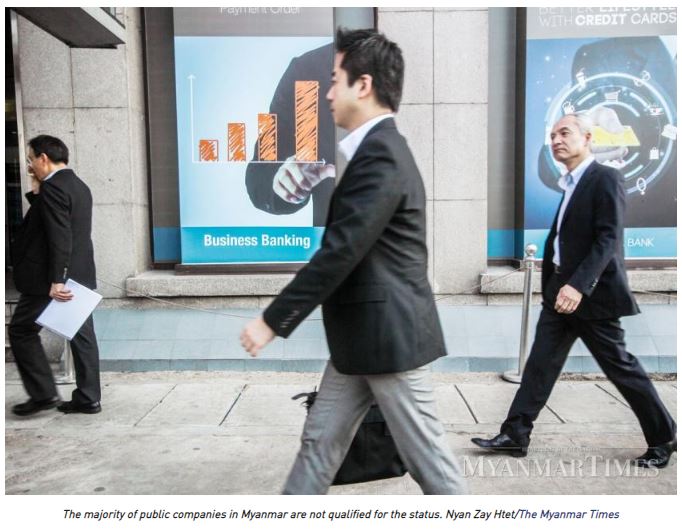Myanmar companies are going public for wrong and risky reasons: experts
The number of public companies in Myanmar has proliferated since former president U Thein Sein’s administration, during which firms were allowed to freely choose between going public and staying private. Between 2012 and 2018, the number rose from just 21 to 331 today.
However, the majority of these firms are not at all prepared to become public companies, with many seeking public status despite being unable to meet the prerequisite conditions, experts told The Myanmar Times.
“In Myanmar, many entrepreneurs establish themselves as public companies from the start as they believe the status will give them access to government projects. But many of these firms lack corporate governance and fail to meet the criteria for a public company. That mindset is wrong,» said U Aung Naing Oo, Director General of the Directorate of Investment and Company Administration (DICA).
Despite the many share sale notices, most public firms are actually not qualified to sell their shares to the public.
Public companies are required to obtain permission from both DICA and the Securities Exchange Commission of Myanmar (SECM) before they are officially allowed to sell their shares. The companies must first meet up to 17 criteria and complete a listing process, which includes an Initial Public Offering (IPO), usually taking up to two years. Unlike a private company, which has a shareholder limitation of not more than 50, there is no shareholder limit for public companies.
Of the 331 companies with public status in Myanmar, only five are listed on the Yangon Stock Exchange (YSX). While DICA has allowed an additional 61 companies to sell shares, these firms must seek additional approval from the SECM to do so.
There are now three companies on the SECM’s List of Approval of Public Offering: Yangon Bus Public Co Ltd, Myanmar Agro Exchange Public Ltd and Amata Holding Public Co.
Risky business
In Myanmar, public companies are set up with two main objectives – to raise capital from the public and compete for government tenders.
There are risks involved for shareholders. “Many companies do not comply with the 17 criteria needed to qualify for public status. In other words, they may not be very financially sound or practice transparent corporate governance. It means they are not quite safe to invest in,» said Dr Maung Maung Thein, economist and former deputy minister of Finance under the previous government.
Unlike many international markets, where qualifying to become a public listed company involves meeting a slew of conditions such as being profitable for a consecutive period of time, providing evidence of growth potential and having competent management, in Myanmar,companies can opt for public status at their inception.
«The majority of the public companies here are not private companies that applied to go public after becoming successful, they are all established as public firms from the start. So out of the 331 public companies in Myanmar, many do not have the characteristics of a public company, said U Aung Thura, CEO of consulting and financial advisory firm Thura Swiss.
«As most public companies are established directly without any business experience, they don’t have a solid income history or market share. There is no certainty in their future either. I can say that 90pc of existing public companies do notmeet the international standards for a public company,” U Aung Naing Oo added.
Although good governance for public companies is important, the majority of Myanmar public companies are weak at it, according to the Myanmar Centre for Responsible Business (MCRB)’s report for 2018. The MCRB analysed a total of 180 companies in its report, 30pc of which were public companies, including the five YSX-listed firms. The results revealed that public companies had lowest score in terms of corporate governance.
“Not many public companies are SECM approved to conduct an IPO because they are not ready. Accounting, restructuring of management, internal controls and good cooperate governance are required to become an SECM-approved public company or listed company,” added U Win Aung, CEO of Amata Holding Public Co.
“If you are a public company, you should be ready to raise your transparency standards and ensure you are profitable. If not, the public will not invest in your company,” said U Win Aung.
More importantly, Myanmar companies should only establish themselves as public when the objectives and goals are clear. “The intention to become a public company must be backed by an objective. Ours is to raise funds to accelerate the expansion of the existing business so that we can compete more effectively both locally and internationally. The organisation can grow faster by going public,’’ said U Win Aung.
Source: https://www.mmtimes.com/news/myanmar-companies-are-going-public-wrong-and-risky-reasons-experts.html


 English
English




